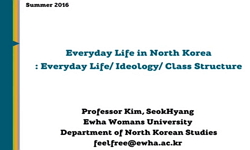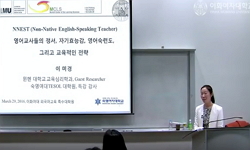Approximately ten years after the ‘English fever’ spread throughout South Korea from the 1990s to the early 2000s, the severe obsession over “standard” English has appeared to diminish to some degree, coinciding with learners’ greater awaren...
http://chineseinput.net/에서 pinyin(병음)방식으로 중국어를 변환할 수 있습니다.
변환된 중국어를 복사하여 사용하시면 됩니다.
- 中文 을 입력하시려면 zhongwen을 입력하시고 space를누르시면됩니다.
- 北京 을 입력하시려면 beijing을 입력하시고 space를 누르시면 됩니다.
부가정보
다국어 초록 (Multilingual Abstract)
Approximately ten years after the ‘English fever’ spread throughout South Korea from the 1990s to the early 2000s, the severe obsession over “standard” English has appeared to diminish to some degree, coinciding with learners’ greater awareness of Global Englishes. To determine whether any changes in their attitudes toward English could be observed, 110 Koreans completed a survey asking questions about their perceptions of Global Englishes, ELT, and the NEST-NNEST dichotomy. Results showed that most considered English to be a global language that does not belong to a particular country. Moreover, many preferred to learn English from a NEST, mainly to enhance English fluency. While nationality was found to play an important role in the choice of the NEST, race was not found to be a determining factor. Such findings point toward a gradual shift in perceptions of English learning and education in Korea.
동일학술지(권/호) 다른 논문
-
- 한국영어학회
- 임수연
- 2022
- KCI등재,SCOPUS
-
Assessing Nativelikeness of Korean College Students’ English Writing Using fastText
- 한국영어학회
- 조혜선
- 2022
- KCI등재,SCOPUS
-
- 한국영어학회
- 오선영
- 2022
- KCI등재,SCOPUS
-
Mapping Speech Act Studies (2000-2020): A Bibliometric Analysis
- 한국영어학회
- Zongfeng Xia
- 2022
- KCI등재,SCOPUS






 KCI
KCI DBpia
DBpia






